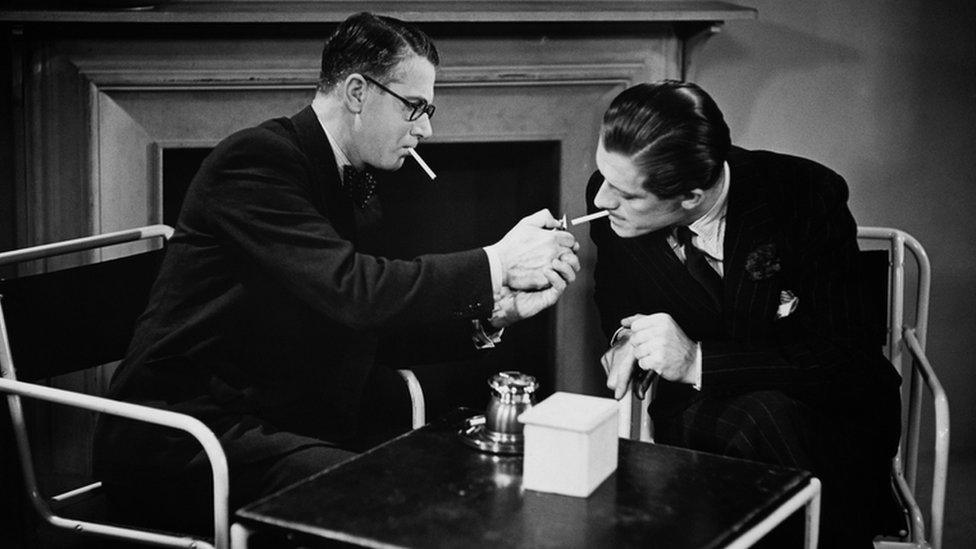Last UK-made cigarettes roll off JTI production line
- Published
- comments

In the 1940s, two-thirds of British men were smokers
The last pack of UK-made cigarettes has rolled off the production line at the JTI plant in County Antrim.
Japanese firm JTI took over Gallaher in 2007, and announced the closure of its Ballymena plant in 2014.
More than 800 people were employed at the factory, the closure of which was seen as a major blow to the local economy.
The last cigarette factory in England, Imperial Tobacco's Horizon factory in Nottingham, ceased operation last May.
When the Horizon factory closed, union officials blamed the growing stigma of smoking, and the industry's drive to new markets in the Far East.

The JTI site is being taken on by bus manufacturers Wrightbus
The announcement of the closure of the JTI Ballymena plant coincided with the introduction of new plain packaging rules. It was symptomatic of society's changing views of smoking.
In a statement, a spokesman for JTI said: "JTI would like to extend its deepest thanks to all current and past members of the Lisnafillan factory team for their dedication over the years and their continued commitment and professionalism until the very end of production.
"We would like to wish them and their families well for the future."

The rise and fall of British smoking
British soldiers fighting in the Crimean war in the 1850s were introduced to the cheap and convenient "papirosi" cigarettes smoked by their Turkish allies - the first UK cigarette manufacturing began.
In the 1850s, Thomas Gallaher from County Londonderry began selling hand-rolled tobacco from a pushcart - he grew the business to become one of the biggest tobacco firms in the world.
Smoking made life bearable for the troops in World War One - Army chaplain Rev Studdert Kennedy became known as "Woodbine Willie" for his habit of distributing cigarettes in the trenches.
Smoking became the norm for British people - in the 1940s nearly two-thirds of men were smokers.
In 1951 the first large-scale study was conducted into the link between smoking and cancer.
The British government bans tobacco advertising on television in 1965.
Smoking in public places was banned across the UK in 2006/7.
By 2016, 15.8% of the UK population were smokers.

William McKittrick, who now owns a business in Portrush, worked at JTI Gallaher for 17 years.
He left the company shortly after the news of the closure.

William McKittrick, who now owns a business in Portrush, worked at JTI Gallaher for 17 years
"It's sad looking back. Before JTI took it over it was a large family business," he told BBC News NI.
"You miss the camaraderie. It was on the cards but we just knew nothing about it.
"Nobody left Gallahers, because of the benefits and wages. People were there for 30 or 40 years and never left. I would still be there if it hadn't closed.
He said the news of the closure came as a "huge shock" when he heard three years ago.
"We new nothing about it at the time. The first I heard was that I got a call as I went i for my night shift and the BBC cameras were there.
'Knocked the stuffing'
"The company explained they were closing in 18 months time. It just knocked the stuffing out of everyone.
"Some people took it really bad, some people like myself realised there was life after it.
"To me, it was just business. It was cheaper to make the cigarettes in another country than it was here and it was a shame but that was that.
"I have friends for life from the company. I was talking to a lady whose husband is finishing this week and was finally retiring having been there for more than 30 years.
He said some of his co-workers had retired and some had gone on to other jobs
"There is life after Gallahers," he said.
"The change has been a real culture shock. You miss the regular wage and holidays but it's good to have your own business, where you're in charge."
Although the manufacture of cigarettes, known in the business as "sticks", has ceased, it does not mean the end of all British-made tobacco products.
Traditionalists with a penchant for snuff can still find little tins of the British-made product in specialist shops.